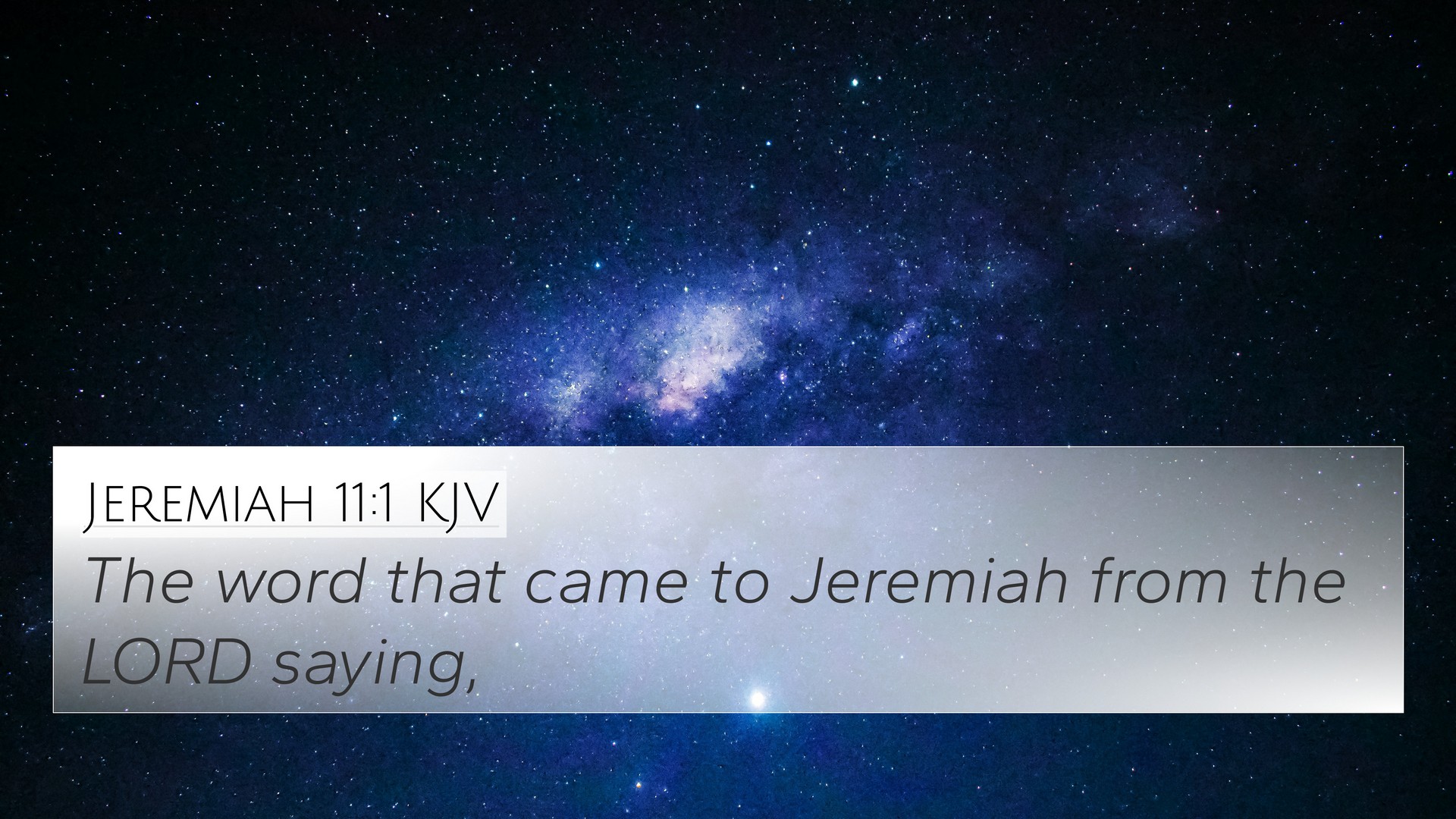Jeremiah 11:1 states: "The word that came to Jeremiah from the Lord saying."
This verse serves as an introduction to a significant portion of the book of Jeremiah, establishing the prophetic authority of Jeremiah and the message that he is about to deliver. In the context of this scripture, it is essential to understand the significance of God's Word in Jeremiah's life and ministry.
Summary of Meaning:
The passage reveals the nature of prophetic communication and God's initiative in revealing His will to His prophets. Jeremiah is chosen as a vessel for conveying God’s message to the people of Judah, highlighting the personal relationship between God and his prophets.
Insights from Commentaries
Matthew Henry emphasizes that the phrase "the word that came" signifies divine communication. It shows that God speaks clearly and definitively, and it is through such words that He directs His chosen servants. God’s communication is personal, and it implies a responsibility on Jeremiah's part to faithfully deliver the message.
Albert Barnes notes the weight of the message that follows this introduction. The significance of being a prophet is underscored when he points out that it is not merely about receiving divine messages but also conveys the urgent call to deliver God's revelations to the people. Jeremiah’s prophetic role is central to the unfolding narrative of Israel’s disobedience and the need for repentance.
Adam Clarke points out that the phrase indicates a process where God actively engages with humanity through His Word. This verse can be seen as a bridge between God’s eternal plans and human actions. Clarke’s insight into the Hebrew meaning of ‘word’ suggests that it embodies both the spoken message and the authority behind the communication of God, encompassing both comfort and warning in its delivery.
Bible Cross References
- 1 Kings 12:22 - The Lord speaks to prophets, indicating His continued guidance.
- Ezekiel 1:3 - The phrase "the word of the Lord came" emphasizes God’s direct communication to His chosen messengers.
- Amos 3:7 - Indicates that God will not act without revealing His plan to His prophets.
- Jeremiah 1:4 - The beginning of Jeremiah's prophetic ministry, showing that God actively calls and commands His prophets.
- Isaiah 6:8 - Highlights God’s calling of Isaiah, representing the same divine invitation given to Jeremiah.
- Hosea 1:1 - Similar opening phrase indicating the prophetic word given to Hosea.
- Micah 1:1 - Another demonstration of God’s Word coming to a prophet.
- Matthew 10:20 - Jesus teaches that the Spirit of God will speak through His followers, continuing the tradition of prophetic guidance.
- Acts 11:28 - Shows the continuation of prophetic messages in the New Testament community.
- 2 Timothy 3:16 - All Scripture is inspired by God, affirming that the Word given to the prophets is foundational for understanding God’s plan.
Thematic Connections
In examining the themes within Jeremiah 11:1, we notice a clear link to the
concept of divine address. This recurring theme in the prophetic literature establishes a pattern of God reaching out to humanity.
Cross-referencing Biblical texts allows us to see how God communicated frequently to His prophets not just in Jeremiah's time but throughout scripture, emphasizing His commitment
to guiding His chosen people.
By linking Bible scriptures across both the Old and New Testaments, we can better understand the mission of prophets, their messages, and how they fulfill God's overarching plan for redemption.
This verse acts as a springboard for comparative Bible verse analysis, as we can explore how other prophets’ call narratives compare to Jeremiah’s.
Exploring Connections Through Cross-Referencing
Additionally, how to use Bible cross-references can enrich our understanding of prophetic literature. By observing how Jeremiah's calling aligns with the experiences of other prophets, we can expand our comprehension of God's working in human history.
Tools for Bible cross-referencing can be pivotal in studying these connections.
Conclusion
In summary, Jeremiah 11:1 serves as a reminder of God's voice throughout history and the significance of prophetic calling. Understanding this verse through public domain commentaries and engaging in
Bible cross-reference guides enhances our insight into how these messages have shaped faith and obedience, linking past revelations with present understanding.


